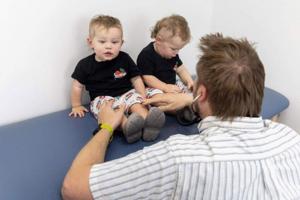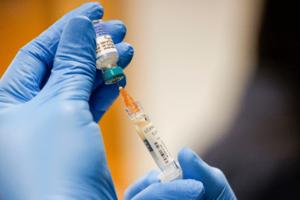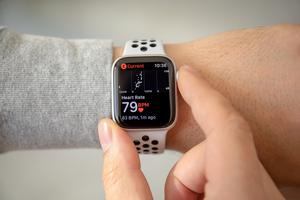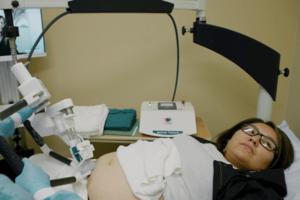Health Advice
/Health

Why you can salvage moldy cheese but never spoiled meat − a toxicologist advises on what to watch out for
When you open the refrigerator and find a wedge of cheese flecked with green mold, or a package of chicken that smells faintly sour, it can be tempting to gamble with your stomach rather than waste food.
But the line between harmless fermentation and dangerous spoilage is sharp. Consuming spoiled foods exposes the body to a range of ...Read more

Measles case confirmed in a person who visited a Montgomery County car dealership and a Wawa
PHILADELPHIA — Montgomery County health officials on Saturday warned residents of a possible measles exposure at two locations in the county, after confirming another case of the highly contagious disease.
A person infected with measles visited a car dealership and a convenience store in Royersford and Limerick earlier this week, officials ...Read more

Clinics sour on CMS after agency scraps 10-year primary care program only months in
CELO COMMUNITY, N.C. — On a 15-degree morning in January, a clinic in the Appalachian Mountains of North Carolina began to fill up with patients.
An older couple in flannel pajamas sat together in the waiting room. A toddler waved as Patricia Hall walked past him, a stethoscope draped over her neck. The family physician waved and smiled back....Read more

What does it mean to medically neglect a child? Idaho lawmakers are divided
In Megan Egbert’s experience, it can often take dozens of calls reporting possible abuse or neglect of a child before the Department of Health and Welfare finally takes action.
The first time Egbert, now a Democratic state representative from Boise, served as a court-appointed representative for a child in foster care, the department received...Read more

Colorado has high levels of radon, which can cause lung cancer – here’s how to lower your risk
In Colorado, as of 2025, about 500 people a year die from lung cancer as the result of radon gas exposure. Nationally, the number of lung cancer deaths attributed to radon is about 21,000 per year.
Radon is present nearly everywhere outdoors, yet typically at levels that are not harmful. It becomes dangerous when it gets trapped and ...Read more

Two months into 2026, Maryland mumps cases already six times last year's total
BALTIMORE — Maryland has reported six times as many mumps cases in early 2026 as it did all of last year, with most infections concentrated in the Baltimore metropolitan area, state health officials said Thursday.
The Maryland Department of Health, or MDH, reported 26 cases — 19 confirmed and seven probable, compared with four cases for all...Read more

Two months into 2026, Maryland mumps cases already six times last year's total
Maryland has reported six times as many mumps cases in early 2026 as it did all of last year, with most infections concentrated in the Baltimore metropolitan area, state health officials said Thursday.
The Maryland Department of Health (MDH) reported 26 cases — 19 confirmed and seven probable, compared with four cases for all of 2025. (The ...Read more

Fourth measles case confirmed in L.A. County; person visited LAX, restaurants while infectious
A fourth measles case has been confirmed in Los Angeles County, prompting renewed calls from health officials for residents to ensure they are protected against the highly contagious virus.
The infected individual flew from Singapore to Los Angeles International Airport on Feb. 9 aboard Singapore Airlines Flight 38. The plane landed at about 7 ...Read more

Kunal Nayyar uses 'Big Bang Theory' money to 'pay random families' medical bills'
“Big Bang Theory” star Kunal Nayyar, who in the 2010s was twice ranked the world’s third-highest-paid TV actor, revealed in a recent interview that he uses his earnings to make donations on GoFundMe.
“Money has given me greater freedom and the greatest gift is the ability to give back, to change people’s lives,” the 44-year-old ...Read more

‘Learning to be humble meant taming my need to stand out from the group’ – a humility scholar explains how he became more grounded
“Humble” is not a word my colleagues would use to describe me, especially early in my career.
In fact, when word got around that I was researching humility, I suspect more than a few choked on their coffee.
And even though I have spent over a decade exploring the concept as an attribute and as a practice, it wasn’t until...Read more

RFK Jr. made promises in order to become health secretary. He's broken many of them
One year after taking charge of the nation’s health department, Health and Human Services Secretary Robert F. Kennedy Jr. hasn’t held true to many of the promises he made while appealing to U.S. senators concerned about the longtime anti-vaccine activist’s plans for the nation’s care.
Kennedy squeaked through a narrow Senate vote to be ...Read more

FDA’s abrupt flip-flop on Moderna’s mRNA flu shot highlights growing risks to drug-makers of investing in vaccines
The Food and Drug Administration’s decision, made public on Feb. 10, 2026, to not review an application to approve Moderna’s proposed mRNA-based flu vaccine set off a firestorm of criticism from public health experts.
But just a week later, on Feb. 18, the FDA backtracked on its decision, saying that it will indeed review the ...Read more

When ICE sweeps a community, public health pays a price – and recovery will likely take years
The Trump administration announced on Feb. 12, 2026, that it is ending Operation Metro Surge, its deployment of more than 3,000 federal immigration enforcement agents in Minneapolis, St. Paul and the surrounding metro area. Federal officials say some agents will remain in the area and have vowed that similar immigration sweeps are coming soon...Read more

Wyoming wants to make its five-year federal rural health funding last 'forever'
Wyoming officials say they have a plan to make five years of upcoming grants from a new $50 billion federal rural health program last “forever.”
The state could tackle rural health issues long into the future by investing its awards from the Rural Health Transformation Program, the director of Wyoming’s health department, Stefan Johansson...Read more

Environmental Nutrition: Caffeine and the human body
Caffeine is a naturally occurring stimulant often found in coffee, tea, chocolate and various energy drinks and medications. But how does caffeine impact the body? Let’s take a system- by-system look at what caffeine really does when it enters your bloodstream.
Central nervous system
Caffeine’s most noticeable effect is on the central ...Read more

Eating Well: Chefs share the best way to make roasted vegetables
Roasted vegetables are a timeless dinnertime staple. Not only are they an easy way to add color and nutrition to your plate, but when done right, roasting brings out the best in every vegetable — crisp edges, caramelized flavors, and tender insides. We spoke with chefs who shared their top tips and secrets for achieving perfectly roasted ...Read more

A fresh approach to cardio exercises
National guidelines recommend adults get at least 150 minutes of moderate-intensity or 75 minutes of vigorous aerobic (cardio) exercise per week. You could meet these goals by exercising at moderate intensity for 30 minutes five times a week, for example, or at high intensity for 40 minutes twice a week. You can mix moderate and vigorous ...Read more

Mayo Clinic Q&A: Why you should know your heart rate numbers
DEAR MAYO CLINIC: When I go for a walk or to the gym, people always seem to be checking their pulse, whether by hand or with a wearable. Why is heart rate so important?
ANSWER: Your heart rate, or pulse, is the number of times your heart beats per minute. Your resting heart rate is when the heart is pumping the lowest amount of blood you need ...Read more

Alabama's 'pretty cool' plan for robots in maternity care sparks debate
It sounds like something from a science fiction novel, but Alabama officials’ plan to use robots to improve care for rural pregnant women and their babies is real.
During a January White House roundtable touting the first grants to states under a new $50 billion rural health fund, Centers for Medicare & Medicaid Services Administrator Mehmet ...Read more

New Medicaid work rules likely to hit middle-aged adults hard
Lori Kelley’s deteriorating vision has made it hard for her to find steady work.
The 59-year-old, who lives in Harrisburg, North Carolina, closed her nonprofit circus arts school last year because she could no longer see well enough to complete paperwork. She then worked making dough at a pizza shop for a bit. Currently, she sorts recyclable ...Read more
Popular Stories
- ‘Learning to be humble meant taming my need to stand out from the group’ – a humility scholar explains how he became more grounded
- Why you can salvage moldy cheese but never spoiled meat − a toxicologist advises on what to watch out for
- Clinics sour on CMS after agency scraps 10-year primary care program only months in
- Measles case confirmed in a person who visited a Montgomery County car dealership and a Wawa
- Kunal Nayyar uses 'Big Bang Theory' money to 'pay random families' medical bills'








